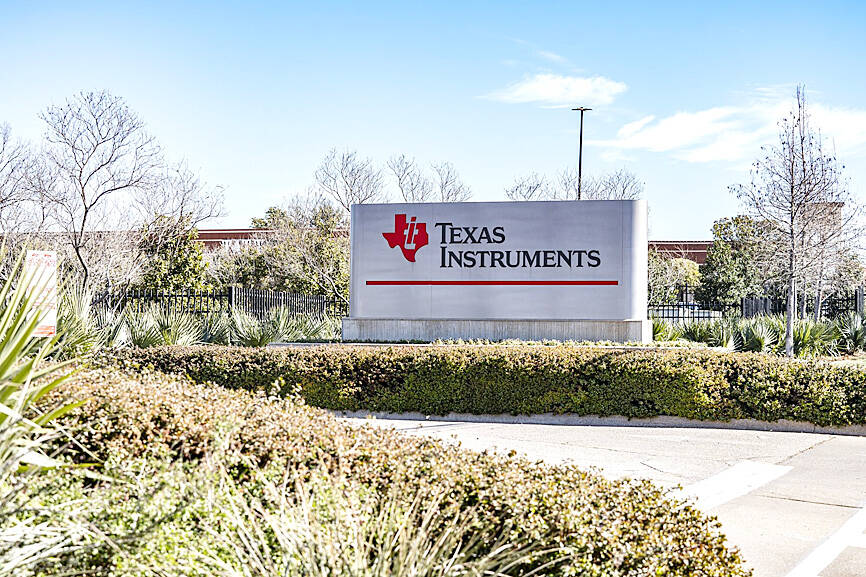Texas Instruments Inc’s shares declined the most in nearly five years on Friday after the chipmaker gave a disappointing earnings forecast for the current period, hurt by still-sluggish demand and higher manufacturing costs.
Profit will be US$0.94 to US$1.16 a share in the first quarter, the company said in a statement on Thursday. The midpoint of that range, US$1.05 a share, was well below the US$1.17 that analysts projected on average.
Much of the electronics industry remains mired in a slump — contributing to nine consecutive quarters of sales declines at the company.

Photo: Bloomberg
Manufacturing expenses also have affected profit, Texas Instruments executives said.
Texas Instruments gets the biggest portion of its sales from manufacturers of industrial equipment and vehicles, making its projections a bellwether for much of the global economy.
Three months ago, executives said some of the company’s end markets were showing signs of emerging from an inventory glut, but the rebound has not come as quickly as some investors anticipated.
The company’s shares fell 7.5 percent to US$185.52 in New York on Friday. That wiped out the stock’s entire gain this year and marked the worst single-day rout since the early days of the COVID-19 pandemic in March 2020.
Texas Instruments CEO Haviv Ilan on a conference call with analysts on Thursday said that industrial demand remains slow.
“Industrial automation and energy infrastructure still haven’t found the bottom,” he said.
In the automotive segment, growth in China was not as strong as it has been, meaning it cannot offset the expected weakness in other parts of the world.
“We haven’t seen the bottom yet — let me be clear,” Ilan said, although the company is seeing “points of strength.”
Sales would be US$3.74 billion to US$4.06 billion in the first quarter, Texas Instruments said, compared with an estimate of US$3.86 billion.
In contrast with the disappointing forecast, December quarter results handily beat analysts’ estimates. Although sales fell 1.7 percent to US$4.01 billion, analysts had projected US$3.86 billion. Profit was US$1.30 a share, compared with a prediction of US$1.21 per share.
Texas Instruments is the biggest maker of chips that perform simple but vital functions in a broad range of electronic devices. It is also the first large US chipmaker to report numbers in the current earnings season.
Chipmakers in other parts of the world have offered a mixed picture of demand for their products. Taiwan Semiconductor Manufacturing Co (台積電), Samsung Electronics Co and SK Hynix Inc have pointed to continuing strength in data center products — helped by the artificial intelligence boom. However, overall growth is still hampered by downturns in other markets, such as smartphones and personal computers.

Intel Corp chief executive officer Lip-Bu Tan (陳立武) is expected to meet with Taiwanese suppliers next month in conjunction with the opening of the Computex Taipei trade show, supply chain sources said on Monday. The visit, the first for Tan to Taiwan since assuming his new post last month, would be aimed at enhancing Intel’s ties with suppliers in Taiwan as he attempts to help turn around the struggling US chipmaker, the sources said. Tan is to hold a banquet to celebrate Intel’s 40-year presence in Taiwan before Computex opens on May 20 and invite dozens of Taiwanese suppliers to exchange views

Application-specific integrated circuit designer Faraday Technology Corp (智原) yesterday said that although revenue this quarter would decline 30 percent from last quarter, it retained its full-year forecast of revenue growth of 100 percent. The company attributed the quarterly drop to a slowdown in customers’ production of chips using Faraday’s advanced packaging technology. The company is still confident about its revenue growth this year, given its strong “design-win” — or the projects it won to help customers design their chips, Faraday president Steve Wang (王國雍) told an online earnings conference. “The design-win this year is better than we expected. We believe we will win

Chizuko Kimura has become the first female sushi chef in the world to win a Michelin star, fulfilling a promise she made to her dying husband to continue his legacy. The 54-year-old Japanese chef regained the Michelin star her late husband, Shunei Kimura, won three years ago for their Sushi Shunei restaurant in Paris. For Shunei Kimura, the star was a dream come true. However, the joy was short-lived. He died from cancer just three months later in June 2022. He was 65. The following year, the restaurant in the heart of Montmartre lost its star rating. Chizuko Kimura insisted that the new star is still down

While China’s leaders use their economic and political might to fight US President Donald Trump’s trade war “to the end,” its army of social media soldiers are embarking on a more humorous campaign online. Trump’s tariff blitz has seen Washington and Beijing impose eye-watering duties on imports from the other, fanning a standoff between the economic superpowers that has sparked global recession fears and sent markets into a tailspin. Trump says his policy is a response to years of being “ripped off” by other countries and aims to bring manufacturing to the US, forcing companies to employ US workers. However, China’s online warriors